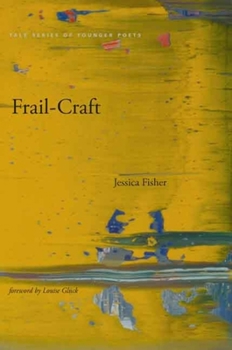Book Overview
Announcing the 2006 recipient of the prestigious Yale Younger Poets prize
Format:Paperback
Language:English
ISBN:0300122357
ISBN13:9780300122350
Release Date:April 2007
Publisher:Yale University Press
Length:96 Pages
Weight:0.40 lbs.
Dimensions:0.3" x 6.2" x 9.2"
Related Subjects
PoetryCustomer Reviews
1 rating
What you find when you're lost
Published by Thriftbooks.com User , 17 years ago
Fisher does not pander to the type of reader who seeks clarity. The poetry of Frail Craft is demanding, and the reader must struggle to understand the nonsensical nature of the connections she makes and unlikely relationships she draws. Regardless of how hard the reader struggles, he or she shouldn't expect to reap complete understanding of such connections. Fisher's intention is not to flaunt her intelligence, but rather to allow the reader to appreciate reading as a process. Celebrating the medium, she frequently references structural components of language, including them in the worlds she creates. The lines "...finally the sea and the sentence enters," "then and then is the time of your verbs, every one of them conjugated" (10) and "Words that might have been puns flooded the living room" (15) all integrate the elements of language into the physical world. In appreciating the process of reading, Fisher's poems also celebrate and explore process in more general terms. Within "Novella" lies the line that best epitomizes the unifying theme of the book: "What you find when you're lost you can't look for, I'd argued: you'd have to get lost to find it again" (39). The title of her first poem, Journey, sets the tone for the rest of the book. Fisher depicts the world through which the narrator and the reader search with senses heightened in terms of absences, more often describing what is not there than what is. She speaks of what people are not doing, what is not known, what colors do not look like, images she does not remember, things one should not do. The lines "It was not here he fell" (8) "I don't remember who spoke..." (10) and "What the jetty is like--gone, because the beloved is gone--" (7) offer the reader a more striking impression than descriptions of strictly what is present could offer. In many of her poems, danger is a recurring theme. Danger is one of the few concepts that Fisher is confident in her knowledge of existence. "The Wedding," "Three Dreams," "Dream for my Other Brother," "Errata," "Reckless" all revolve around the concept. Fisher specifically refers to children and her brothers as the ones in danger. Fisher's language generally has a formal air, as if she were addressing strangers with particularly specific and official matters. The subjects of her sentences, however, are not subjects of an official nature. Fisher's incongruous pairing of formal tone and playful subject matter creates a sense of absurdity. Reading the preceding formal language, one would hardly expect the thing that the narrators is "compelled to tell you" is that "yesterday the sun shone" (17).






